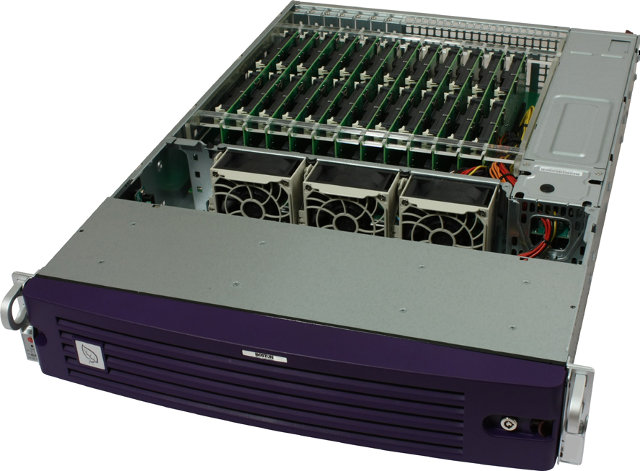At the end of 2011, Boston, a British IT company, announced plans for an ARM server based on Calxeda Quad Core Cortex A9 Server-on-Chip, and now the company recently announced they started to ship the server (called Viridis) to their first customers.

We now have further details about the server including the key features:
- Ten times the performance at the same power in the same space
- Cut energy and space by 90%
- Easily scalable to thousands of nodes
- 48 SoC devices delivered across 12 Calxeda EnergyCard modules
- Each EnergyCore SoC contains an ARM quadcore processing unit, providing a total of 192 cores per 2U enclosure
- Low power consumption: <300W with each SoC consuming between 0.5 to 5W depending on the load.
- Up to 24 SATA HDDs or SSD devices
- Up to 192GB of RAM per 2U enclosure
A Calxeda EnergyCard (pictured below) features 4 Calxeda EnergyCore ECX-1000 SoC which can individually support up to 4GB DDR3 DRAM, 2 10GbE interfaces and 4 SATA connectors.

The company explains that with 48 nodes available in a 2U enclosure, their solution can power up to 1008 nodes per 42U rack while consuming less than one tenth the power.
Due to better support in the latest Linux operating systems for Calxeda SoC, Boston is using Ubuntu 12.10 and Fedora 17 development releases on the Viridis server. The register reports that the total cost of the server with 48 nodes (192 cores) and 24 hard drives should be around 50,000 USD, and at around $1000 per node it is considered cheap.
The company has 20 customers for the Viridis server in the United States, Europe, and in Asia. To know more about Boston Viridis, you can check out the product brief and a white paper entitled “Revolutionizing the data center with application-specific servers based on ARM processors“

Jean-Luc started CNX Software in 2010 as a part-time endeavor, before quitting his job as a software engineering manager, and starting to write daily news, and reviews full time later in 2011.
Support CNX Software! Donate via cryptocurrencies, become a Patron on Patreon, or purchase goods on Amazon or Aliexpress




